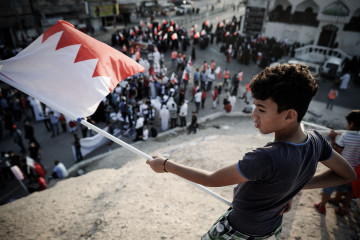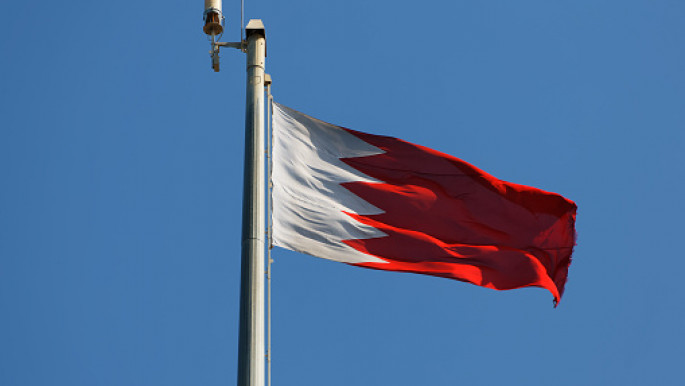

In light of last month’s Chinese-brokered Saudi-Iranian diplomatic agreement, the smaller Gulf Cooperation Council (GCC) member-states will be paying close attention to upcoming developments in Riyadh-Tehran relations.
Although Saudi Arabia’s five GCC neighbours have their own unique bilateral relationships with Iran and different threat perceptions of Tehran, they all welcome lower temperatures between the Kingdom and the Islamic Republic and more Chinese diplomacy in the Middle East aimed at creating more stability.
More than any other GCC state, the Kingdom of Bahrain sees Iran as an enormous threat to its internal security.
As the only Shia-majority Gulf Arab country ruled by a monarchy, Bahrain has always been more susceptible than the other GCC members to Tehran’s influence and vulnerable to Iran’s quest to export its 1979 Islamic Revolution.
"More than any other GCC state, the Kingdom of Bahrain sees Iran as an enormous threat to its internal security"
Understanding how Manama officials perceive the threat posed by the Islamic Republic requires going back to the late 1970s and early 1980s - a time of much revolutionary fervour in Iran when neighbouring countries such as Bahrain feared what Ayatollah Ruhollah Khomeini’s clerical government and supporters across the Arab world could do to the region.
Established under the coordination of Iran’s Grand Ayatollah Hussein-Ali Montazeri, the Islamic Front for the Liberation of Bahrain (IFLB) was an “Iranian proxy organization” that was “symptomatic of the greater externality of the Iranian revolution,” explained Dr Steven Wright, an Associate Professor of International Relations at Hamad Bin Khalifa University.
In December 1981, the IFLB attempted a coup with the aim of forming an “Islamic government” in Bahrain and expelling America’s military presence from the archipelago nation.
Bahraini authorities arrested hundreds of IFLB members and sentenced 73 to prison, including 11 Saudis, one Omani, and one Kuwaiti - but notably not one single Iranian.
“Some of the plotters, who the [Bahraini] Government said had been trained in Iran, had automatic weapons, and some had Bahraini police uniforms, apparently made in Iran,” reported the New York Times at the time.
To this day, the Islamic Republic has ties to certain anti-government Shia militant groups in the archipelago country such as al-Ashtar Brigades and Saraya al-Mukhtar.
In the aftermath of Bahrain’s 2011 Arab Spring, the rulers in Manama became more unsettled by the potential role that Islamic Revolutionary Guard Corps (IRGC)-backed Bahraini Shia opposition organisations could play in the country.
This is not to say, however, that all Bahraini Shia are loyal to Iran. Many are not and face discrimination from some elements in Manama and other GCC capitals, which depict all Bahraini Shia grievances as an outcome of Iranian meddling instead of internal issues.
There is also a history of Tehran’s sovereign claims to the archipelago nation. Since Bahrain joined Saudi Arabia in cutting off diplomatic relations with Iran in January 2016, Bahrain’s independence and territorial integrity have been increasingly important factors in tensions between Manama and Tehran.
|
|
“There have been numerous instances in which quasi-official Iranian media and even Iranian officials have, for the first time in the era of the Islamic Republic, publicly raised and reiterated the old Persian claim to 100 percent of Bahraini territory as an official part or province of Iran,” said Dr Hussein Ibish, a senior resident scholar at the Arab Gulf States Institute in Washington, in an interview with The New Arab.
“This was, of course, Iranian policy under the Shah until he was compelled by Britain and the United States to renounce the claims. But it's always been clear that Bahraini officials never really believed that Iranians in general had given up on the aspiration of, from their perspective, ‘re-incorporating’ all of Bahrain as either a province or a part of another province of Iran. And such fears, unfortunately, appear to have been justified,” added Dr Ibish.
At the same time, Iran has perceived Bahrain’s foreign policy as a threat too. As one of the US’s Major Non-NATO Allies (MNNA), which also hosts the Fifth Fleet, Manama plays a critical role in facilitating Washington’s military footprint in the Gulf.
Additionally, as the second Arab state to join the Abraham Accords, Tehran feels threatened by Bahrain’s relationship with Israel, which since 2020 has been establishing a presence in the Gulf that terrifies the Islamic Republic.
"The Iran-Saudi agreement will lead to a reduction in tensions in the region, which could potentially create a more stable environment for Bahrain and other Gulf states"
A new beginning?
Despite these serious problems and tensions in bilateral affairs, sources in the Middle East recently told Amwaj Media that Manama and Tehran have been engaging each other diplomatically through “low-profile exchanges” in recent months.
Against the backdrop of the 10 March Saudi-Iranian diplomatic deal, one of the sources stated that “after the reopening of the embassies in Tehran and Riyadh, there will after a short period of time also likely be a normalisation between Iran and Bahrain”.
There have been other signs of a thaw in Bahraini-Iranian relations. On 13 March, an Iranian delegation attended the 146th Inter-Parliamentary Union Council Assembly in Bahrain and met with a Bahraini parliamentarian.
That same day, the spokesman for Iran’s Foreign Minister spoke about advancing the “path of diplomacy” while asserting that “with the positive atmosphere that we are witnessing in the region, this positive development can happen in connection with other regional countries as well, including Bahrain”.
On 21 March, the Bahraini parliament’s First Deputy Speaker, Abdulnabi Salman, stated that flights between the two countries will “soon” resume.
In an interview with Al Jazeera on 29 March, Iran’s top diplomat, Hossein Amirabdollahian, explained that Oman’s Sultan Haitham recently visited Bahrain to discuss the state of Manama-Tehran relations, highlighting a continuation of Muscat’s longstanding role as a diplomatic bridge between Iran and Arab states.
Within the context of the Saudi-Iran diplomatic deal, there is a real possibility of Bahrain and Iran’s relationship becoming more tempered.
“The Iran-Saudi agreement will lead to a reduction in tensions in the region, which could potentially create a more stable environment for Bahrain and other Gulf states. Additionally, it could potentially lead to less rhetoric from Iran in support of the Shia in Bahrain,” Dr Wright told TNA.
|
|
Challenges ahead
It will not necessarily be easy for Bahrain and Iran to overcome the serious problems in their bilateral relationship even if Riyadh and Tehran’s relationship significantly thaws.
“Viewing Iran as the primary existential threat to its national security, Bahrain's lack of trust will likely result in any improvements in relations being limited to superficial diplomatic measures and more restrained rhetoric,” explained Dr Wright.
“Consequently, we should not anticipate any substantial enhancement of ties between the two nations beyond diplomatic courtesies in the near future.”
Other experts have similar assessments. Dr Ahmed Khuzaie, the author of 'Entanglement: A history of Iranian Bahraini relations', said in a TNA interview that while the détente in Saudi-Iranian relations would positively impact Bahraini-Iranians relations he advises against rushing toward the conclusion that ties between Manama and Tehran are set to significantly improve too quickly.
The Islamic Republic’s “talks with Bahrain would require more than just press releases from Iran to be considered serious,” he said.
"From Tehran's perspective, Bahrain is guilty of bringing hostile external actors (ie. the US and Israel) into the Gulf, directly threatening Iran"
If Bahrain and Iran’s bilateral ties improve with Tehran reducing, or perhaps stopping, its support for anti-monarchical Shia factions in Bahrain, it would be possible to “imagine such a virtuous circle beginning to take place” that would involve an easing of pressure on both the government in Manama and Shia opposition groups which are willing to work with Bahrain’s Sunni leadership, according to Dr Ibish.
“There is nothing really that could stop it if everyone has the will to act accordingly. The trouble is I would have to begin with Iran pulling back its support from groups that are highly embedded in the IRGC and its regional network of armed gangs, and there is no reason to think that Iran is ready to do that.”
Dr Ibish went on to assert that such Iran-backed groups in the region are, from Tehran’s perspective, too cost-effective when it comes to projecting Iranian influence across the Middle East to imagine the Islamic Republic abandoning such factions. Doing so would come at a “very high cost and run against every instinct of the Iranian Revolutionary state”.
Believing that Bahrain’s government is more likely to maintain its national security-oriented strategy rather than adopting a more conciliatory and inclusive approach to the Shia opposition, Dr Wright said that Manama’s “concerns over growing Iranian influence and trust issues may hinder progress”.
He explained that the impact that a possible resumption of Bahraini-Iranian relations could have on the archipelago nation’s domestic politics depends on the specifics of any such deal between Tehran and Manama, as well as how the two countries act after the signing of the agreement.
“However, it remains quite unlikely that we will see any significant shifts in the Bahraini government's engagement with the Shia opposition as a direct result of its diplomatic engagement with Iran and the evolving regional context between Saudi Arabia and Iran,” added Dr Wright.
In the final analysis, Bahrain and Iran are set to maintain their views about the other being a menace. Manama will continue understanding the Islamic Republic as a predatory actor committed to waging asymmetric and surrogate warfare in the Arab world.
From Tehran’s perspective, Bahrain is guilty of bringing hostile external actors (ie. the US and Israel) into the Gulf, directly threatening Iran - a perception that is unlikely to change until or unless Manama’s relationships with Washington and Tel Aviv do.
Yet, there is now a unique opportunity for Manama and Tehran to address their problems through dialogue and, potentially, resume diplomatic relations.
Looking ahead, it will be critical to see the extent to which China’s leverage over the Islamic Republic can result in any changes in Iranian conduct in the region that could perhaps begin the process of slowly assuaging the Al Khalifa rulers’ concerns about Tehran’s intentions and agendas toward Bahrain and other GCC states.
Giorgio Cafiero is the CEO of Gulf State Analytics.
Follow him on Twitter: @GiorgioCafiero





 Follow the Middle East's top stories in English at The New Arab on Google News
Follow the Middle East's top stories in English at The New Arab on Google News


